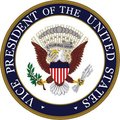John C. Calhoun
|
|
JohnCCalhoun.jpeg
John C. Calhoun
John Caldwell Calhoun (March 18, 1782 – March 31, 1850), was a prominent United States politician in the first half of the 19th century. His staunch determination earned him the nickname the "cast-iron man". Calhoun served South Carolina in the United States Senate and also in the House of Representatives, and as Secretary of State, Secretary of War, and the seventh Vice President. His party affiliation was Democratic-Republican.
John Calhoun received his bachelor's degree from Yale in 1804. In 1810 he was elected to Congress, and became one of the War Hawks who, led by Henry Clay, agitated for what became the War of 1812. After the war, he proposed a Bonus Bill for public works. In 1817 he was appointed Secretary of War under James Monroe.
After the odd election of 1824, Calhoun became Vice President under John Quincy Adams. He soon broke with Adams and the National Republicans, who seemed to favor northern interests.
John_C._Calhoun.jpg
John C. Calhoun
He also became Andrew Jackson's running mate in the election of 1828, and again was Vice President. Calhoun had developed a theory of nullification that states (or minorities) could nullify federal legislation, based on the fact that individual states had ratified the Constitution. In this he disagreed with Jackson, who opposed the idea of nullification. This opened a rift between Calhoun and Jackson, which was exacerbated by the Eaton Affair. In 1832, the theory of nullification was put to the test when South Carolina passed an ordinance that claimed to nullify federal tariffs. The "Nullification Crisis" almost degenerated into violence, but coercion by US Navy warships in Charleston averted a secession. During the crisis, Jackson said in a famous toast, "Our federal Union—it must and shall be preserved." In Calhoun's toast, he replied, "Our Union; next to our liberties most dear." The break between Jackson and Calhoun was complete, and Calhoun was not Jackson's running mate in 1832.
On December 28, 1832 he became the first Vice President to resign from office, having accepted election to the United States Senate from his native South Carolina. The Force Bill was proposed by Congress prohibiting states from nullifying federal laws. The Compromise of 1833 settled the matter for a number of years.
In 1844 he was reappointed Secretary of State by John Tyler. Calhoun returned to the Senate in 1848 and died in 1850 in Washington, DC. He was buried in St. Phillips Churchyard in Charleston, South Carolina. In 1957, United States Senators honored Calhoun as one of the "five greatest senators of all time", and was later among the "seven greatest" named in 2000 Senate resolution.
He penned Disquisition on Government (http://www.southernnationalist.org/disquisition_on_government.htm) and Discourse on the Constitution and Government of the United States.
Calhoun's son-in-law was Thomas Green Clemson, another prominent South Carolinian who became the founder of Clemson University. Today, the campus rests upon the Fort Hill estate that Calhoun once called home.
See also
External links
- University of Virginia: John C. Calhoun (http://xroads.virginia.edu/~CAP/CALHOUN/2Ahed.html) - Timeline, quotes, & contemporaries
- Other images: [1] (http://teachpol.tcnj.edu/amer_pol_hist/fi/000000b2.htm), [2] (http://teachpol.tcnj.edu/amer_pol_hist/fi/000000b3.htm), [3] (http://teachpol.tcnj.edu/amer_pol_hist/fi/000000b1.htm)

